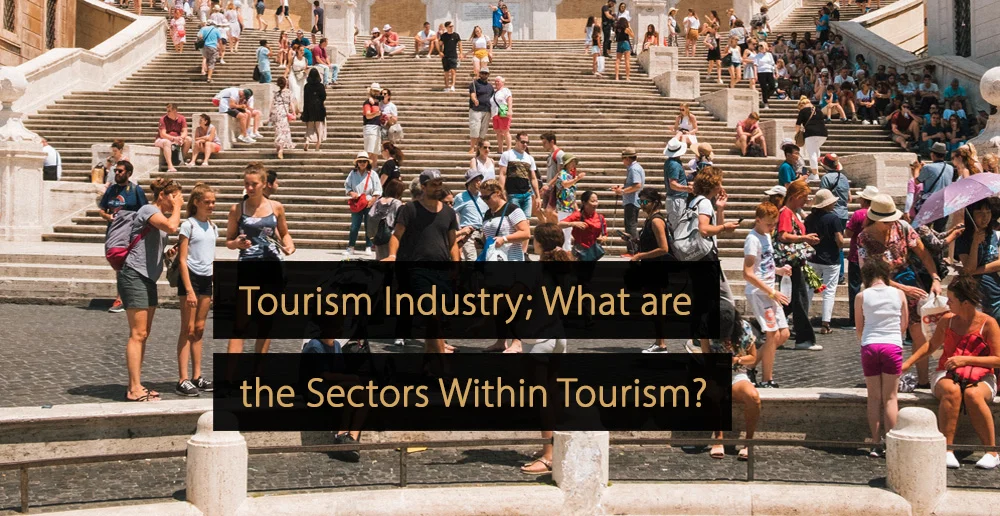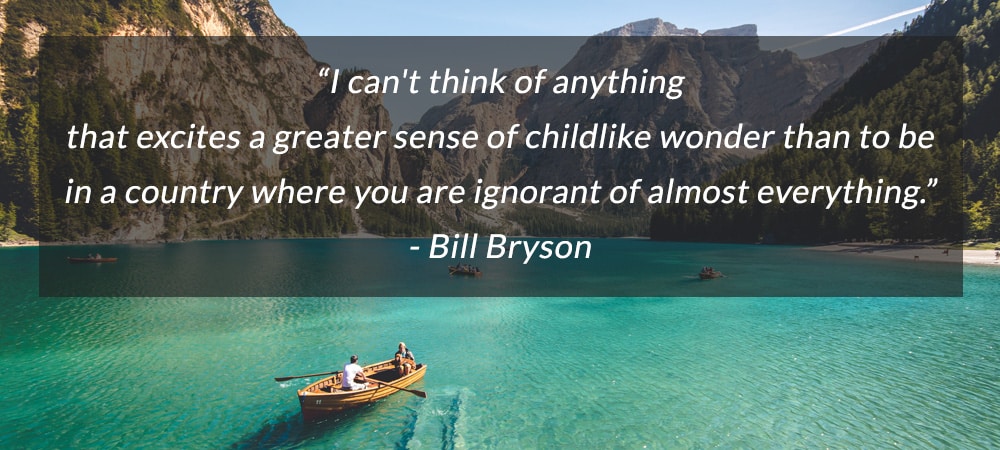The tourism industry, also known as the travel industry, is linked to people traveling to other locations, either domestically or internationally, for leisure, social, or business purposes. It is closely connected to the hotel industry, the hospitality industry, and the transport industry. Much of it is based on keeping tourists happy, occupied, and equipped with the things they need during their time away from home.
Table of Contents:
- What is the Tourism Industry?
- The Tourist
- What Are the Benefits of the Tourism Industry?
- What Are the Sectors Within the Tourism Industry?
- Video Tourism Industry – Tourism and Economic Development
- Types of Tourism
- Cultural Tourism
- Sports and Events Tourism
- Sustainable Tourism
- Adventure Tourism
- Recreational Tourism or Leisure Travel
- Business Tourism or Corporate Travel
- Domestic Tourism and Staycations
- Rural Tourism
- Medical Tourism or Health Tourism
- Agritourism – Farm and Ranch Stays
- Dark Tourism, Black Tourism or Grief Tourism
- Culinary Tourism or Food and Drink Tourism
- Religious Tourism or Spiritual Travel
- Travel Agencies to Boost Bookings in the Tourism Industry
- The Latest Tourism Marketing Tips
- Trends in Tourism: What You Need to Know
- The Emerging Technology Trends in the Tourism Industry
- Revenue Management & Tourism Industry
- Sustainable Development in the Tourism Industry
- Slow Tourism and the Tourism Industry
- Job Boards for Finding Tourism Industry Jobs
- List of Websites to Find Tourism Management Jobs
- Tourism Manager Tips and Job Description
- Tips to Find Tourism Industry Careers
- Tourism Course: An Overview of Tourism Industry Education
- Google Travel Insights: Data and Tools for the Tourism Industry
- Tourism Management
- How the Coronavirus Pandemic Has Impacted the Tourism Industry
- Other Related Industries
What is the Tourism Industry?
So, what is the tourism industry? First, it is important to define what the ‘tourism industry‘ means. Essentially, it refers to all activity related to the short-term movement of people to locations away from where they usually reside. It is one of the world’s largest industries, and the economies of many nations are driven, to a large extent, by their tourist trade.
It is also a wide-ranging industry, which includes the hotel industry, the transport industry, and several additional industries or sectors. According to the Travel & Tourism Worldwide research report by Statista, the Travel & Tourism Industry is projected to reach $927.30 billion by 2024. It is vital to understand that the tourist industry is linked to movement to different locations, based on leisure, business, and some additional travel motivators.
With that being said, according to the most common definitions, the tourism industry does not cover activities related to travel where the person intends to stay in their destination for longer than one year. As an example, this means that expatriates and long-term international students are not technically classed as tourists.
The Tourist
In simple terms, a tourist travels to another location, away from their usual social environment, for business, pleasure, or social reasons. By most accepted definitions, to be classed as a tourist, a person needs to stay at that location for longer than 24 hours but for no longer than one year.
Tourists may be motivated to travel by various factors, such as refreshment of body and mind or the pursuit of excitement, entertainment, or pleasure. Alternatively, travelers may be driven by cultural curiosity, self-improvement, business, a desire to visit friends and family, or to form new relationships.
While business travelers are usually classed as tourists, it is worth noting that many definitions of the word exclude those who travel to make an income in the place that they travel to.
What Are the Benefits of the Tourism Industry?
Tourism offers a wide range of benefits, including economic benefits for countries attracting many visitors due to the money they spend not only on their actual stay but also on local businesses. It also provides many jobs for people working in the transport and hospitality industry, among others.
Moreover, tourism can potentially improve relationships between nation-states or businesses, create opportunities for entertainment and recreation, and improve the value of a currency. It can also open up cultural exchange opportunities, while for tourists, it can lead to improved happiness, well-being, and education.
Table: Benefits of the Tourism Industry
What Are the Sectors Within the Tourism Industry?
1) Transportation
The transportation sector is concerned with helping tourists get where they need to go, via transport. This may include providing them with the means to get to their intended holiday destination in the first place, but it may also include assisting them with getting around after they arrive at their destination.
This sector includes road, rail, air, and sea travel services.
Airline Industry
The airline industry plays a vital role in modern travel, providing passengers with access to domestic and overseas flights, allowing them to reach their intended destinations via commercial aircraft quickly. Airline services are generally divided into scheduled and chartered flights. According to the Aviation Research Report by Statista, the global size of the airline industry in 2023 is $814.5 billion.
Car Rental
For many tourists, having access to a car is an important part of their tourist experience, ensuring they can explore and travel freely. Car rental services provide this access and often operate near airports or even in partnership with particular airlines or travel companies.
Water Transport
As the name suggests, the water transport sub-section concerns movement across the water. This includes ocean liners and ferry transport, where the objective is usually to get passengers from A to B. It also includes cruise liners, where being on the cruise liner forms the main part of the travel experience.
Coach Services
Coach and bus services are an important part of the tourism industry, offering long-distance travel, assisting airport passengers with travel to their accommodations, taking groups of tourists on day trips to local attractions or popular tourist destinations, and offering access to other nearby towns and cities.
Railway
Rail travel has played a key role in the tourism industry since the 19th century and continues to do so. Railways not only provide a means for travelers to get to their destination, but overground and underground rail services also provide options for navigating many of the major towns and cities that tourists visit.
Spacecraft
A new element of the transport sector – and one that will become increasingly important in the years ahead – involves using spacecraft to carry tourists into space. Indeed, Virgin Galactic, recently sent the VSS Unity spaceplane into outer space and is planning to offer commercial flights to ‘space tourists’ in the near future.
2) Accommodation
The accommodation sector is central to the travel and hospitality industry because people traveling to different areas require somewhere to stay, rest, sleep, and unwind. In fact, by many definitions, a tourist is only classed as such if their stay exceeds 24 hours and they use some form of overnight accommodation.
This subsection has many components, ranging from the hotel industry to camping, hostels, and cruises. These sub-sections are explained in greater detail below:
Hotels
Hotels are the most obvious and popular form of accommodation for tourists, and the hotel industry is inextricably linked to the tourism industry. Hotels provide paid lodgings for guests. Aside from beds and other essential facilities, their services can vary quite drastically.
Shared Accommodation
Recently, shared accommodation has emerged as a major option for tourists. One of the most popular services offering shared accommodation is Airbnb, where users can list spare rooms and rent them out to travelers on a short-term basis. These could be individual, private rooms, or shared common areas.
Hostels
A hostel is typically a lower-priced accommodation option, suitable for those operating on a lesser budget or those who are attempting to reduce their travel costs. It is a sociable accommodation, where multiple guests rent beds in a shared space, typically with communal bathroom and kitchen facilities.
Camping
Camping is staying outdoors overnight in a tent or similar type of shelter. While tourists may opt to camp in public areas, commercial campsites are popular and often more convenient. These commercial sites will typically charge for access but will also provide additional facilities or utilities.
Bed & Breakfast
B&B accommodation offers a few rooms for guests and offers overnight stays and breakfast in the morning. In most cases, guests will have a private bedroom and bathroom, although bathroom facilities are sometimes shared. The owners or hosts of these establishments will often live in the bed & breakfast, too.
Cruises
Cruises also come under the accommodation sector because cruise liners serve as a form of accommodation in their own right. Typically, on a cruise, travelers will be allocated their cabin, and the cruise itself will last a set time, with tourists staying on the cruise ship for most of the duration.
Video: Cruise Industry Travel Boom
Farmhouse Accommodation and Agri-Tourism
Travelers are increasingly willing to stay in farmhouse accommodation, usually on a self-catering basis. This is linked to agri-tourism, where tourists visit farms, learn about the work that goes on there, and sometimes even participate in the daily work as part of the travel experience.
Time-Share Accommodation
Finally, time-share accommodation, or vacation ownership accommodation, refers to accommodation where ownership or usage rights are divided between multiple individuals. These individuals are allotted their time frame – typically a week or two weeks out of the year – where they have the right to use the property.
3) Food and Beverage
The food and beverage sector has an interesting role within the tourism industry, providing tourists with essential refreshments at all stages of their travel experience, including during travel, when spending time in their chosen accommodation, and when they are out and about exploring the location they have traveled to.
In addition to catering to travelers’ basic requirements, however, the food and beverage sector also offers them opportunities to socialize, meet new people, and enjoy themselves.
Restaurants
Restaurants or eateries provide one of the main ways tourists eat food and socialize on their travels. This category includes everything from fast-food restaurants like McDonald’s and KFC, to family restaurants and luxury restaurants offering high-end cuisine.
Catering
Catering is usually recognized as providing food services at more remote locations. Within this sub-section would be the various food and drink offerings found at hotels and other accommodation types, as well as on planes, cruise ships, or trains. It also includes offerings at many tourist attractions or entertainment sites.
Bars & Cafés
Bars and cafés are an important part of the local economy in many travel destinations, offering tourists a more relaxed location to consume refreshments, drink alcohol, and socialize with locals or other tourists. They tend to be smaller than restaurants and may have a theme or serve a fairly general range of products.
Nightclubs
Nightclubs are one of the single most essential parts of the food and beverage sector, providing travelers with entertainment during the night and attracting many tourists to some destinations in the first place. Indeed, some travel hotspots base their entire industry around nightlife.
4) Entertainment
Some tourists travel to new locations in pursuit of entertainment. Such travelers may be drawn to entertainment options not available in their home location or require more general entertainment, which would be accessible almost anywhere in the world, as part of their trip.
Entertainment attractions or venues are sometimes the main things that draw travelers to a particular tourist location. On the other hand, many other entertainment offerings are set up to capitalize on existing tourism.
Casino
Casinos are entertainment facilities centered around gambling activities. Most of these activities are games of chance, although casinos also offer games with some skill element. Additionally, casinos are commonly connected to hotels and may offer further entertainment, such as music or comedy performances.
Tourist Information
In the modern travel and hospitality industry, tourist information exists online and offline. Online tourist information includes informational websites highlighting local attractions, tourist sites or facilities. Meanwhile, offline services include tourist information centers and literature the tourist board produces.
Shopping
The retail and travel industries are closely connected, and most major tourist destinations will also provide shopping facilities. In some cases, shopping can attract tourists in the first place, while the shopping sub-section of the entertainment sector also includes things like duty-free shopping and local market trading.
Tourist Guides & Tours
Tourist guides provide tourists with access to organized tours of local attractions, landmarks, educational buildings, and other places of interest. In doing so, they can offer assistance, expert insight, and context, often making the experience more enjoyable, convenient, and worthwhile for the tourist(s).
5) Connected Industries
Finally, some industries are directly or indirectly connected to tourism. These include industries based on actually connecting customers with travel services, as well as industries based on providing customers with important information that can assist them in their travels.
Some of the most notable related industries are detailed in greater depth below:
Financial Services
Financial services can be linked to the travel industry in several ways, with the most obvious being the provision of insurance products, which offer financial protection in emergency situations, or in cases where medical treatment is needed. Additionally, financial services may be connected to things like currency exchanges.
Travel Agents
Travel agents sell travel or tourism-related products to customers on behalf of suppliers. They generally receive a commission from suppliers and offer travelers advice on the best travel products to suit their needs or preferences. Some travel agents also offer business travel services.
Tour Operators
Tour operators tend to sell package holidays, which combine multiple travel and tour services into a single product. A package holiday might, for example, include charging tourists for flights, airport transfers, a hotel stay, and services from a local rep. It could also include holiday experiences or a set itinerary.
Online Travel Agencies (OTAs)
Online travel agencies, or OTAs, offer similar services to other travel agents, although these services are delivered over the Internet, providing more of a self-service experience. Some popular OTAs include Expedia, Booking.com, Kayak, and lastminute.com. These OTAs may also double as metasearch engines.
Tourism Organisations
Tourism organizations exist to look out for the tourism industry and act on its behalf. They may influence national tourism policies, lobby governments in the interests of the tourism industry, and work to bring the various sectors together.
Educational
Finally, the travel industry also increasingly includes an educational component, with many people traveling to attend conferences or exhibitions, often centered around specialized topics. Additionally, schools and training programs form part of this sub-section of the travel and hotel industry.
Video Tourism Industry: Tourism and Economic Development
This video describes some of the arguments for and against tourism as a fundamental driver of growth and development, particularly in lower and middle-income nations.
Types of Tourism
Within the tourism industry, there are a number of different types of tourism to be aware of. In the sections that follow, you can learn about the main types, how they are defined and what they achieve.
Cultural Tourism
Cultural tourism is a type of tourism where the traveler is motivated by a desire to learn about and engage with the history, traditions, practices and cultural attractions of a location. It is often concerned with experiencing other ways of life and engaging with people, but cultural tourism can also help to fund conservation efforts too.
By its very nature, cultural tourism can take many different forms, with relevant activities including visiting monuments, museums and religious sites, attending festivals, engaging with the arts or learning the local language. It can also provide communities with a means of monetizing their cultural heritage, although efforts do need to be taken to limit some of the possible negative side effects of a booming tourism industry.
Video: Things you Need To Know about Cultural Tourism
Sports and Events Tourism
Sports serve as a major attraction within the tourism industry and sports tourism is any form of travel where attending a sporting event is the primary motivation. This includes people who are going to spectate and people who are participating in the event. Sporting events can provide a major short-term boost to the economy.
Examples of sports tourism include fans traveling to follow their favorite sports team, or people traveling to see a major event, such as the soccer World Cup, the Olympic Games, or the US Open in tennis. Often, the presence of major events can attract thousands of visitors and additional investment in the area, leaving a positive legacy.
Sustainable Tourism
Sustainable tourism aims to minimize the impact of tourism on the environment, nature and local communities. At its best, it balances the needs of local people, businesses and travelers, while protecting wildlife, helping to make the tourism industry more viable in the long term. Examples of sustainable practices include reducing waste, using renewable energy, sourcing food locally, or switching to transportation methods with lower emissions.
In the “Sustainable Tourism Guide: What is, Why Important, Examples and More…“ article, you can learn more about the different types of sustainable tourism, the key benefits, the challenges and the reasons for its popularity.
Adventure Tourism
Adventure tourism describes forms of tourism that include an element of risk and where physical exertion and special skills may be needed. It provides tourists with an opportunity to enjoy thrills or unique experiences and encourages them to step away from their usual way of life to try something more adventurous.
Examples of activities that fall under the definition of adventure tourism include mountain climbing, bungee jumping, scuba diving and trekking. Adventure tourism offerings can be found in many popular tourist destinations, but some adventure tourists actively seek remote locations, away from the crowds associated with the mainstream tourism industry.
Video: What Is Adventure Tourism?
Recreational Tourism or Leisure Travel
Tourism which is primarily motivated by leisure, enjoyment and relaxation can be categorized as recreational tourism. It allows tourists to escape their everyday lives and take part in different activities, enjoy new forms of entertainment, and generally focus on having fun. Catering for recreational tourists and providing plenty of activities and entertainment options also allows the tourism industry in a destination to grow, providing jobs and boosting the local economy.
Through recreational tourism, people are often able to physically recharge, while boosting their mental health. The industry itself will frequently highlight opportunities for tourists to make lasting memories.
Business Tourism or Corporate Travel
Travel for business purposes is referred to as business tourism or business travel. It is a huge part of the tourism industry and is usually motivated by a desire to exchange knowledge and forge business relationships. Crucially, business tourists are still classed as working, but are doing so away from their usual place of work.
Business tourism allows individuals to learn, network, share ideas and teach skills, while it can enable businesses to reach out to potential customers or business partners and gain access to new markets. Examples of activities that may occur during business travel include attending conferences, exhibitions, business dinners, meetings or workshops.
Video: What Is Business Travel?
Domestic Tourism and Staycations
Domestic tourism is a form of tourism where a person travels to another location within the country they usually reside in. This may include staycations, weekend breaks and other similar trips. Domestic tourism contributes greatly to the tourism industry in many countries and often provides tourists with a cheaper alternative to traveling to a different country. Domestic trips can also be easier to organize, meaning convenience is a motivating factor.
Many hotels actively target domestic tourists with their marketing efforts, because they can provide year-round business. Domestic tourism can be especially important in large countries, like the United States.
Rural Tourism
The basic definition of rural tourism is tourism that is focused on areas away from major settlements like towns and cities. However, rural tourism also typically extends beyond simply visiting rural locations and involves actively participating in a rural way of life. Examples include camping trips, hiking trips, agritourism, which is typically focused on farms or ranches, and ecotourism, which is a form of responsible travel to natural areas.
Rural tourism helps to alleviate some of the negative side effects of the tourism industry on urban areas and provides a boost to local economies. It can be a more sustainable form of tourism, but may put pressure on communities too.
Medical Tourism or Health Tourism
Medical tourism or health tourism occurs when an individual travels to another country for the purpose of receiving medical treatment. It can have negative connotations, as it may put excessive pressure on a healthcare system, but some countries actively target people from other countries and advertise access to specific treatments.
Historically, medical tourism primarily appealed to people living in countries with a poor healthcare system. However, in more recent times, a number of countries have found that offering cosmetic procedures or access to experimental treatments can attract a large number of visitors and provide a major boost to the tourism industry.
Video: What Is Medical Tourism?
Agritourism – Farm and Ranch Stays
Agritourism combines agricultural activities with tourism and will typically involve a tourist staying on a farm, ranch or similar property. It allows the tourist to experience day-to-day life in an agricultural setting, teaching them aspects of the business’ operations, while providing entertainment. For the agricultural business, it serves as an additional revenue stream, allows them to enter into the tourism industry and can help them to survive.
Common examples of activities that tourists may participate in include feeding animals, riding horses, picking fruit and eating meals made on the farm, using produce from the farm.
Dark Tourism, Black Tourism or Grief Tourism
Dark tourism, or black tourism, is a sub-section of the tourism industry focused on places that are associated with tragedies. Sometimes described as grief tourism, it will include visits to battlefields, prison camps, sites associated with disaster, and other historical locations linked to death and suffering.
Dark tourism does not always have negative connotations and can be educational, with respectful intentions. Examples of this include trips to the Auschwitz concentration camp, the Killing Fields in Cambodia, the World Trade Center in New York City, or the area surrounding the Chernobyl Nuclear Power Plant.
Video: Dark Tourism
Culinary Tourism or Food and Drink Tourism
Culinary or food tourism describes travel that is primarily motivated by food experiences. People may travel to a different part of the world to try local cuisine and become immersed in a country’s culture through food. It also clearly highlights the interconnected nature of the hospitality industry and the tourism industry.
This form of tourism primarily appeals to food enthusiasts, but also attracts people who work with food, such as chefs and restaurant owners. Culinary tourism can also include people who are motivated by drinking rather than eating, with wine tasting serving as a especially popular form of culinary tourism in many parts of the world.
Video: Culinary Tourism
Religious Tourism or Spiritual Travel
As the name suggests, religious tourism is tourism for reasons related to religion and spirituality, such as pilgrimage or educational visits to sacred locations. It can form a crucial part of some religions and popular religious trips are often a key contributor to the local economy. Religious tourism may also help people from different cultures to share ideas, exchange cultural practices and understand one another.
Some of the biggest examples of religious tourism include Hajj and Umrah pilgrimages to Mecca by Muslims, or visits to the Vatican City by Christians. Another example would be a trip to a Buddhist temple or retreat. Often, important religious trips are facilitated by businesses in the tourism industry offering specific services.
Travel Agencies to Boost Bookings in the Tourism Industry
Travel agencies can be essential for maximizing the number of customers a travel company reaches and attracting bookings. However, different agencies specialize in different areas of the tourism industry and appeal to different types of customers. With this in mind, working with the right travel agency to further your strategic objectives is important.
Read “Travel Agencies: Find the Right Travel Agency to Boost Bookings,” and you will be able to find out more about the value of travel agencies and access a list of some of the main platforms to try to partner with.
The Latest Tourism Industry Marketing Tips
From social media sites to remarketing, the Internet offers hundreds of ways for travel and tourism businesses to connect with their niche audience. Just as tourists’ traveling needs and behavior have changed, so has the way tourism businesses market their services.
This is where tourism marketing plays an important role in promoting touristic services, such as hotels, restaurants, transportation, and destinations. To help guide you to make the right decisions regarding your tourism marketing plans, take a look at this article, ‘Tourism Marketing’.
Trends in Tourism: What You Need to Know
Tourism has evolved faster than ever before as modern travelers care more about their carbon footprint and travel needs. Emerging tourism trends are extremely important for businesses to remain relevant in this fast-changing industry.
In the article ‘Tourism Trends: Opportunities for The Tourism Industry’, get to know all the latest trends playing a major role in the tourism industry.
The Emerging Technology Trends in the Tourism Industry
Technology has played a vital role in the tourism industry for over a decade now by helping businesses minimize costs, improve efficiency, and enhance the customer experience.
Businesses and customers can highly benefit from technology trends for improved reservations, guest services, and communication. ‘Key Technology Trends Emerging in the Travel & Tourism Industry’ is an informative guide that explains the key tech trends in the tourism sector.
Revenue Management & Tourism Industry
Revenue management is highly relevant in the tourism industry, airlines, restaurants, coaches, railways, cruises, and car rentals. This concept is about increasing profits and generating more revenue. Income growth can be multiplied in the hospitality sector if all the company’s departments adopt revenue management. After all, it’s all about selling the service to the right customer at the right time. The best examples of revenue management and its importance are in this article, ‘Revenue Management; clearly explained!’.
Sustainable Development in the Tourism Industry
Tourism development is creating and maintaining a functioning tourism industry within a particular place. Sustainable tourism development takes this concept a step further by focusing on environmental, social, and economic concerns and taking steps to reduce any negative consequences associated with the industry.
In the article “Benefits of Sustainable Tourism Development,” you can learn more about what sustainable tourism development means and how it works while reading about its specific benefits.
Slow Tourism and the Tourism Industry
Slow tourism is an emerging trend within the wider tourism industry, with connections to sustainability and reducing the impact of tourism. It is an approach that contrasts with ‘mass tourism’, placing emphasis on enjoying the culture, characteristics, and history of a local area, rather than trying to cram an itinerary full of tourist activities.
In the article “Slow Tourism: What It Is, Its Importance, and Examples”, you will be able to read a more comprehensive definition of slow tourism, learn about its value, and read about some of the main slow tourism types, as well as some of the most common destinations for travelers engaging in slow tourism practices.
Job Boards for Finding Tourism Industry Jobs
If you want to advance a career in tourism, job boards represent one of the best options available. After all, a wide range of employers will use these platforms to advertise vacancies. Different job boards will provide you with access to various roles in different sectors of the tourism industry.
Read “Tourism Jobs: The Best Tourism Industry Job Boards for Your Career” for a list of some of the best job boards available, broken down according to which sector(s) they focus on.
List of Websites to Find Tourism Management Jobs
For anyone seeking tourism management jobs, it is important to understand that there will be high levels of interest from candidates. For this reason, to maximize your chances, you should apply for as many positions as possible, and this means using a variety of websites, including those that specialize in advertising tourism industry jobs.
Read the “Tourism Management Jobs: List of Websites to Find Your Next Job” article for a breakdown of the various online channels and websites you can use to find your next job.
Tourism Industry Manager Tips and Job Description
As the tourism industry is so diverse, consisting of several different sub-sectors, tourism manager jobs can vary quite significantly. Nevertheless, these positions also tend to share similarities in terms of responsibilities, duties, and entry requirements, which makes it possible to provide tips for securing such a role.
The “Tourism Manager Job Description + Tips to Boost Your Career” article will provide important details on what a management job will consist of while offering tips on how to apply for such a role successfully.
Tips to Find Tourism Industry Careers
The tourism industry is broad in its definition and offers various roles, from entry-level positions right the way up to senior management roles, across several different sectors. Yet, competition can be fierce for many roles, making applying for tourism careers somewhat challenging.
Read “Tourism Careers: Tips to Find a Job in the Tourism Industry” for more details on the various steps you can take during the application and interview phases and beyond to secure your ideal job.
Tourism Course: An Overview of Tourism Industry Education
A tourism course can be the perfect base to build upon when starting a tourism industry career or looking to move into a more senior position. The courses available vary in terms of the specific aspects of the industry they focus on, but they can greatly enhance your long-term career prospects.
To learn more about these courses, the topics they cover, where you can find them, and the educators that provide access, read the “Tourism Course: A Complete Overview of Courses & Tourism Educators” article.
Google Travel Insights: Data and Tools for the Tourism Industry
Google offers a wide range of tools and services to help those in the tourism industry enhance performance, and Google Travel Insights is a good example. The platform provides access to valuable data and industry insights, so that businesses and marketing professionals can make more strategic decisions.
Read “Google Travel Insights: Tools & Data Trends for The Travel Industry” for more information about the Google Travel Insights platform, the three core components, and why these are so useful.
Tourism Management
The tourism industry has a wide and deep impact on many other sectors that it’s involved in. From the infrastructure and the country’s economy to the cultural and social environment, tourism plays a vital role that you may not otherwise get in other industries. Working in tourism management opens up a world of new opportunities that are few and far between in other sectors. To start your career in the tourism industry, read the article, ‘Tourism Management: All You Need to Know About Tourism’.
Tourism Industry FAQs
The tourism industry is extremely diverse but plays an essential role in the economic prosperity of many countries. Tourists are typically defined as people traveling to locations away from their homes on a short-term basis for non-financial reasons. The tourism industry encompasses all services connected to this process.
Want to Learn More About Related Industries?
The hospitality industry is part of the travel industry, and the hotel industry is part of the hospitality industry. All these industries have in common that they are large service industries worldwide and increasingly important in the modern age. But what is the difference between the travel and tourism industry? And what are all hospitality sectors within the hospitality industry? In the following articles, you learn more about related industries.
- Travel Industry; An Overview of One of the Largest Service Industries
- Hotel Industry; An Overview of All Different Types of Accommodations
- Hospitality Industry; Everything You Need to Know About Hospitality
- What is the Difference Between the Travel and Tourism Industry?
- Airline Industry: All You Need to Know About The Airline Sector
- Aviation Industry: Everything You Need to Know About the Aviation Sector
- Everything You Need to Know About the Cruise Industry
- Space Tourism: Space Companies That Will Make You An Astronaut
- Restaurant Industry: Overview, Types, Examples and More
More Tips to Grow Your Business
Revfine.com is the leading knowledge platform for the hospitality and travel industry. Professionals use our insights, strategies, and actionable tips to get inspired, optimize revenue, innovate processes, and improve customer experience.Explore expert advice on management, marketing, revenue management, operations, software, and technology in our dedicated Hotel, Hospitality, and Travel & Tourism categories.
This article is written by:
Hi, I am Martijn Barten, founder of Revfine.com. With 20 years of experience in the hospitality industry, I specialize in optimizing revenue by combining revenue management with marketing strategies. I have successfully developed, implemented, and managed revenue management and marketing strategies for individual properties and multi-property portfolios.












Amazing content. I was not aware of all this information. thank you for sharing this with us. I hope you will provide us with more informative content about the tourism industry.
Tourism is a great contribution to the world economy. Large emerging economies, including developed ones, depend largely on the tourism industry. Tourism is a great source of income and employment for countries that receive more tourists, which has a significant impact on the main economies of the world.
Where can I find more information about the impact of the pandemic on the tourism industry worldwide?
Ich habe diese information sehr lehreich gefunden 🤗
I am a Tourism Management second-year student at Nelson Mandela University; next January, I should be doing my Work Integrated Learning for six months(Jan-Jun) to finish my diploma. Could anybody advise me on where to find a place where I can do my training?
Destination Management plans are another name for the strategic tourist planning done for a destination. Different tourism strategies are used in various parts of the world. It is crucial for managing goals sustainably. As the import and export of goods and services increase the country’s economy and produce foreign exchange, tourism is a key component in boosting economies of scale.
May I know who is the author of this article to give credit for my research? Thank you!
Hi John, this article is written and regularly updated by the Revfine.com team. You can give credits to the website Revfine.com.
Thank you for sharing such an informative blog about tourism. In this sector, students also have great career opportunities. Please share an article about career opportunities in the tourism sector, if you have time.
Hi Emma, the following articles might help :)
– Tourism Management Jobs: List of Websites to Find Your Next Job
– Tourism Careers: Tips to Find a Job in the Tourism Industry
– Tourism Jobs: The Best Tourism Industry Job Boards for Your Career
Also the category Staffing & Career Tips might help your students.
This comprehensive article provides an insightful overview of the tourism industry, covering everything you need to know. From its economic impact and global trends to sustainable practices and emerging technologies, this resourceful guide offers a valuable understanding of the multifaceted world of tourism – a must-read for both industry enthusiasts and curious travelers.
Thank you for the information.
Hi everyone; I find this site to be very informative. Can somebody please clearly distinguish between ‘Cultural and Ethno’ tourism?